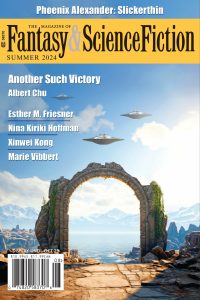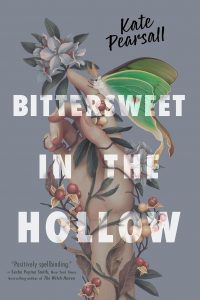Strange Horizons, F&SF, and Kaleidotrope: Short Fiction Reviews by Charles Payseur
 Strange Horizons 9/16/24, 10/7/24, 10/14/24
Strange Horizons 9/16/24, 10/7/24, 10/14/24
F&SF Summer ’24
Kaleidotrope Autumn ’24
Strange Horizons has been firing on all cylinders lately, as with September’s “A War of Words” by Marie Brennan, a poem that imagines a war where the winners take more than wealth, more than land. They take language, leaving survivors without a way to contain their loss that isn’t filtered through the lens of their oppressors. It digs into conflict and a war that is less about battle and loss in the traditional sense and is much more about losing a sense of self, a community, or national identity. It’s a form of colonization, leaving the defeated with no option but to adapt to a world where they are lesser. It’s a fantastic read. Natasha King opens the October fiction with “The Aquarium of Lost Souls”, an intense story in which a woman finds herself in “allspace,” outside of the regular universe, inside a kind of aquarium ship that is actually the last part of the Pacific Ocean, sentient in the ways of water and forever cut off from the vast stretches that were lost when Earth was destroyed. Together the two deal with being caught between life and death, between reality and… something else. The woman is not in a good way, bleeding from a wound in her side and dying over and over again just to reappear in the ray tank. Apart, the two can do little enough, but when they start working together they find that they are far from powerless, even in their imperiled state. It’s a tense, beautiful, dreamlike story, and King does a great job slowly revealing what’s really happening, and how precarious this situation truly is. David Bowers-Mason continues the themes of loss and broken worlds in the poem “Phrogger”, which is a kind of haunted house story. The narrator of the piece lingers in their home, watching a new family live there from behind the wallpaper and in the forgotten spaces of the attic and walls. They have a body, one that can fit into the narrowest confines, and they have patience enough to wait for their opportunity to make their presence fully known. It’s a very appropriate poem for October and spooky season, and it’s well worth checking out!
After some delay, F&SF is back with a new summer issue, and Tonya R. Moore makes a strong debut at the publication with “Water Baby”, a story that finds Niobe, one of the last holdouts on an island community plagued by disappearances and rising ocean waters. Ever since Niobe’s mother, the mayor, went missing, she’s been doing everything she can to hold the community together, but nothing seems like enough, and every day brings more people deciding to take their chances on the mainland. Climate change might be the least of her worries, though, when she uncovers something decidedly sinister going on, and finds that there were a lot of things her mother never told her. Moore succeeds at creating an eerie and captivating setting, an island succumbing not only to the ocean but to its own corruptions and secrets, which can stay hidden no longer. The pacing kept me on the edge of my seat, twisting as it moved relentlessly to a shattering and satisfying ending. The poetry of the issue is also great, including the F&SF debut “I, Magician” by Julie Eliopoulos, which unfolds as a master directing their apprentice. There is a generational feeling to the piece, knowledge passing from teacher to student as people try to save what and who can be saved. There is a grim underpinning to the poem, that time and circumstance might erase what has been built over years and years, the work of generations threatened by so many potential losses. The poem becomes a kind of spell – one of survival and endurance – that reminds us how important poets and poetry can be, even (and perhaps especially) in the face of terrible circumstances. It’s a lovely read. The issues closes with Phoenix Alexander’s “Slickerthin”, which again brings the focus to an island community, though here one that lives under the shadows of harpies. These beings provide the people of the island with their own eggs for nourishment, which help the inhabitants grow big and strong. For Anaximander, though, the dream of living up to the body image he sees in his fathers and the rest of the community seems to take a fatal hit when he cracks open an egg to find a slickerthin, a kind of stunted harpy he is supposed to care for and love and raise. The story explores the complexity of care, self-image, and the difficulty of giving love when a person doesn’t really love themself. It’s at times a difficult read, full of a familiar kind of angst and anxiety, and Alexander does a beautiful job of showing in Anaximander someone lost and yearning so hard for something that seems always out of reach. And the ending leaves readers to pick up the pieces of what happens on the island, the strangeness and the wonder and the love. It’s very much worth spending some time with.
The latest from Kaleidotrope features Chaitanya Murali’s “Of Black Town’s Monster”, a story that unfolds around Aditya, who has already lost a father to the British and who is told again and again by his mother to stay out of trouble because there is a monster stalking the streets. That’s easier said than done when there is a hunger among the colonizers for bodies to fuel their ambitions and cruelties. When Aditya gets the attention of a powerful British officer things seem bleak indeed, but he also meets a young woman named Devyani who has been paying attention and has tracked the monster preying on their people to a familiar and foreign source. Murali mixes action and adventure, horror and hope in a thrilling experience that doesn’t shy away from the grim realities of colonialism and empire but still focuses on family, community, and resistance in a fun way. H.L. Fullerton also contributes to the issue with “Friends of the Fanilae”, a complex look at human-alien relations that focuses on… cosmetic surgery. Because in the story aliens, the fanilae, have come to Earth in part as refugees, settling and trying their best to work and live in the human-dominant world. It’s only through surgery that they’re able to better adapt to the planet and be able to have a higher quality of life healthwise. But there’s also the social aspect, where fanilae who have surgery to appear more human see benefits when it comes to getting jobs and being viewed favorably. So the whole thing has become complicated, with the very real medical advantages intertwined with catering to human prejudice and almost requiring these aliens to change their bodies in order to be successful, something that parallels a lot of nonspeculative discriminations that find people seeking voice coaching, skin lightening, and even more extreme measures to try and assimilate. Fullerton shows insight and care in approaching some very heavy themes, and manages to be interesting and entertaining in a very memorable way. In the issue’s poetry, Angela Acosta’s “First Sojourn” is about movement and survival as humans seek a new home after Earth and after perhaps spending some time as uploaded consciousnesses. Corporeal again, humans seek to learn from the mistakes of their past – the violent colonialism that saw subjugation and attempted (and successful) genocides around the world. The piece reaches for a kind of reset – a hope that this settlement will be different, building on the lessons hopefully learned after so much pain and loss. There is a respect given to life, whatever its varieties and differences, and a determination to do better that resonates and provides a powerful message.
Recommended Stories:
“The Aquarium of Lost Souls”, Natasha King (Strange Horizons 10/24)
“Water Baby”, Tonya R. Moore (F&SF June ‘24)
“Friends of the Fanilae”, H.L. Fullerton (Kaleidotrope 10/24)
Charles Payseur is an avid reader, writer, and reviewer of speculative fiction. His works have appeared in The Best American Science Fiction and Fantasy, Lightspeed Magazine, and Beneath Ceaseless Skies, among others, and many are included in his debut collection, The Burning Day and Other Strange Stories (Lethe Press 2021). He is the series editor of We’re Here: The Best Queer Speculative Fiction (Neon Hemlock Press) and a multiple-time Hugo and Ignyte Award finalist for his work at Quick Sip Reviews. When not drunkenly discussing Goosebumps, X-Men comic books, and his cats on his Patreon (/quicksipreviews) and Twitter (@ClowderofTwo), he can probably found raising a beer with his husband, Matt, in their home in Eau Claire, Wisconsin.
This review and more like it in the December 2024 issue of Locus.
 While you are here, please take a moment to support Locus with a one-time or recurring donation. We rely on reader donations to keep the magazine and site going, and would like to keep the site paywall free, but WE NEED YOUR FINANCIAL SUPPORT to continue quality coverage of the science fiction and fantasy field.
While you are here, please take a moment to support Locus with a one-time or recurring donation. We rely on reader donations to keep the magazine and site going, and would like to keep the site paywall free, but WE NEED YOUR FINANCIAL SUPPORT to continue quality coverage of the science fiction and fantasy field.
©Locus Magazine. Copyrighted material may not be republished without permission of LSFF.





